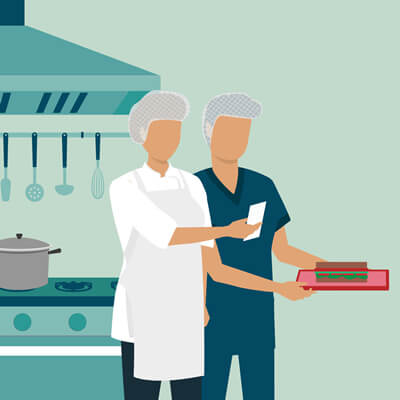All about Allergens for Hospitals: Kitchen Managers and Supervisors

About this course
Gain knowledge about food allergy, adopt best practice procedures for food allergen management in the kitchen, and ensure staff are taking the necessary precautions when preparing meals for patients with food allergy.
Who this course is for
- Kitchen managers
- Kitchen supervisors
- Food service managers
- Food safety managers
- Food safety auditors
- Dietitians
Course modules and learning outcomes
There are four units in this All about Allergens course. Learning outcomes are assessed with short end of unit quizzes and a longer final assessment.
Unit 1: Food allergy overview
- Understand food allergy and the consequences of serving the wrong food to a patient with food allergy.
- Know what an allergic reaction might look like.
- Know the difference between a food allergy, a food intolerance and coeliac disease.
- Be able to list the common food allergens in Australia.
Unit 2: Hospital obligations and duty of care
- Understand what the law states about providing food to patients with food allergy.
- Identify strategies that hospitals can use to make sure that patients receive accurate information about the food allergen content of menu items when they tell staff about their food allergy.
- Understand the roles and responsibilities of the patient with food allergy (or their guardian), nursing and ward support staff, dietetics and the food service department.
- Describe a simple food allergy management process for a hospital.
- Apply tools such as the food allergy policy and food allergen management audit tool to address food allergen management at your hospital.
Unit 3: Understanding food labels for food allergy
- Understand food labelling laws in Australia for packaged and unpackaged foods.
- Demonstrate knowledge of reading food labels and identifying food allergens on a label.
- Be able to identify food allergens in products, recipes, packaged foods, ingredient lists, meal components, condiments and garnishes.
- Understand Precautionary Allergen Labelling statements and what these mean for patients with food allergy.
Unit 4: Practical management of food allergens in the kitchen
- Know how to prepare foods suitable for patients with food allergy.
- Identify and manage areas of possible cross contamination in food service.
- Demonstrate an understanding of simple strategies to use to know exactly what is in the food served by your kitchen.
- Know how to effectively communicate with staff about a patient’s food allergy and food order.
Unit 5: Providing the right meal to the patient
- Identify and implement strategies in the kitchen to ensure that the right meal or fluid is given to the right patient.
- Understand how to report incidents related to food allergy.
Course length
This course takes approximately 1.5 hours to complete.
Your progress is saved along the way, so you can stop and come back to the course at any time. It is recommended you complete the course within 2 weeks.
How often to undertake this course
You should undertake this training at least every 2 years.
Latest version
All about Allergens for Hospitals: Kitchen managers and supervisors (released 4 March)
To start this course Register or enrol
Older versionsAll about Allergens for Hospitals: Kitchen managers and supervisors (released 20 September 2020 | superseded 4 March 2023)
